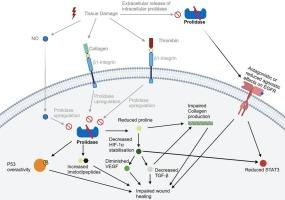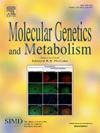Beyond proline shortage: New insights into the pathophysiology of prolidase deficiency
IF 3.5
2区 生物学
Q2 ENDOCRINOLOGY & METABOLISM
引用次数: 0
Abstract
Prolidase deficiency is an ultra-rare metabolic disorder caused by pathogenic variants in the PEPD gene, which causes a wide range of symptoms including chronic ulcers, recurrent infections, systemic lupus erythematosus (SLE), facial dysmorphisms and developmental delay. How decreased prolidase activity - thus an inability to cleave C-terminal proline imidodipeptides - eventually causes these symptoms is as yet poorly understood. However, recent research has unveiled additional roles of prolidase in cellular homeostasis, including regulation of important signalling molecules such as TGF-β, VEGF and p53. This study proposes that dysregulation of these pathways leads to impairments in important wound healing processes, which could explain the combination of chronic ulcers, developmental delay and propensity for autoimmunity, with symptoms such as bone deformities and recurrent infections being the result of impaired intracellular signalling. This article provides a more comprehensive understanding of prolidase deficiency and opens the way for developing new therapeutic avenues.

超越脯氨酸短缺:对脯氨酸酶缺乏症病理生理学的新见解
脯氨酸酶缺乏症是一种由PEPD基因致病性变异引起的超罕见代谢疾病,可引起多种症状,包括慢性溃疡、复发性感染、系统性红斑狼疮(SLE)、面部畸形和发育迟缓。脯氨酸酶活性的降低——因此不能切割c端脯氨酸酰二肽——是如何最终导致这些症状的,目前还知之甚少。然而,最近的研究揭示了增殖酶在细胞稳态中的其他作用,包括调节重要的信号分子,如TGF-β、VEGF和p53。这项研究提出,这些通路的失调导致重要伤口愈合过程的损伤,这可以解释慢性溃疡、发育迟缓和自身免疫倾向的组合,以及骨畸形和复发性感染等症状是细胞内信号受损的结果。本文提供了一个更全面的认识,并为开发新的治疗途径开辟道路。
本文章由计算机程序翻译,如有差异,请以英文原文为准。
求助全文
约1分钟内获得全文
求助全文
来源期刊

Molecular genetics and metabolism
生物-生化与分子生物学
CiteScore
5.90
自引率
7.90%
发文量
621
审稿时长
34 days
期刊介绍:
Molecular Genetics and Metabolism contributes to the understanding of the metabolic and molecular basis of disease. This peer reviewed journal publishes articles describing investigations that use the tools of biochemical genetics and molecular genetics for studies of normal and disease states in humans and animal models.
 求助内容:
求助内容: 应助结果提醒方式:
应助结果提醒方式:


